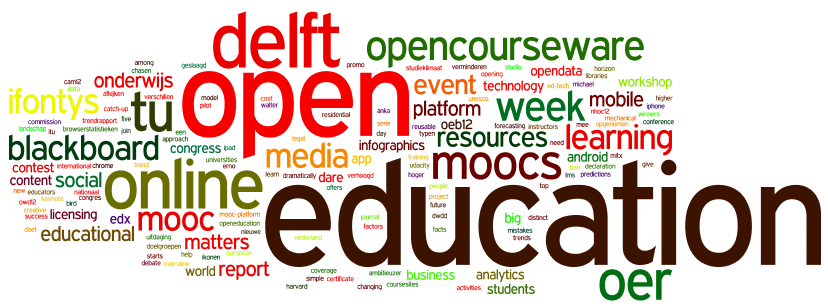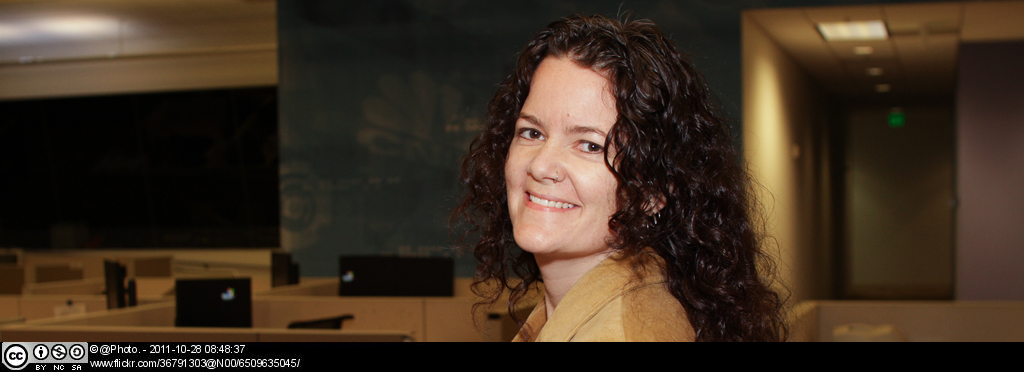This is the 100th blogpost that I publish on this blog in 2012. In this blog an overview of the most populair posts and other statistics. The image above is a wordle of all the titles I published this year.
Category: "Algemeen"
Audrey Watters is one of the rare Educational Technology (Ed-Tech) journalists and she is really good at it (support her). This month she is doing a serie about the top Ed-Tech trends of 2012. She has publiced 10 really great articles which everyone in education should read:
- The Business of Ed-Tech
It's been a major story this year: broken educational institutions under seige by Silicon Valley. - The Maker Movement
The Maker Movement reflects the technological, political, and economic zeitgeist: the need for a technologically skilled work force, hope for a revival of American manufacturing, concern about STEM education all the while cutting many of the programs in schools that foster these skills to make more room for more standardized testing. - Learning to Code
It was sheer marketing genius: the announcement on January 1 by the learn-to-program startup Codecademy that 2012 should be “Code Year.” - The Flipped Classroom
“Flipping the classroom” is hardly new. But with all the hype surrounding both Khan Academy and MOOCs, it’s hardly surprising that the practice became incredibly popular this year. - MOOCs
Massive Open Online Courses. MOOCs. This was, without a doubt, the most important and talked-about trend in education technology this year. - The Battle to Open Textbooks
The most exciting change in digital textbooks comes with efforts like these hackathons, where teachers and learners are the creators not just the consumers of OER. - Education Data and Learning Analytics
She wrote about “data” as one of the top trends of 2011, noting at the time that this often meant simply “quantitative data” — or more accurately even, standardized test results. There was certainly plenty of interest in (and handwringing about) testing this year, and perhaps the political and financial pressures from that continue to spur this trend. Certainly there were a number of ed-tech companies that offered data “solutions” and learning analytics. But who uses these tools? Who benefits? And who owns the data? - The Platforming of Education
There seems to be an interesting tension here with education platforms and the “unbundling of education.” We have heard a lot this year about “unbundling”: that many the services once offered by schools — content delivery, assessment, credentialing, research, mentorship, affiliation and networking, job placement — will no longer be monopolized by them. - Automation and Artificial Intelligence
Why would we want to automate it? Why, for the sake of efficiency, of course. We have to scale. Process more students. We have to assess more content. Write more. Grade more. Test more. Cut costs. Etc. - The Politics of Ed-Tech
Education is political — inherently so and despite the protestations from some quarters when what happens in our schools, in our textbooks, in our brains “becomes politicized.” Education is political not simply because of the governmental role — federal, state, local — in school funding and policies. It is political because of the polis — the connections between education and community. Education is political because learning is at once personal (and, of course, “the personal is political”) and social; it is both private and public.
Het artikel "Technology Changing How Students Learn" is alweer van bijna een maand geleden, maar het bevat wel interessante informatie. Volgens docenten verandert het leergedrag van studenten door technologie:
There is a widespread belief among teachers that students’ constant use of digital technology is hampering their attention spans and ability to persevere in the face of challenging tasks, according to two surveys of teachers being released on Thursday.
Interessant vind ik ook het Wikipedia-problem:
students have grown so accustomed to getting quick answers with a few keystrokes that they are more likely to give up when an easy answer eludes them
Volgens de onderzoeken vinden 76% van de docenten dat studenten hier last van hebben. Ik herken dit gedrag wel bij studenten. Volgens mij is hier ook een belangrijke taak voor docenten. Als je opdrachten voor studenten maakt, probeer dan ook zelf hoe snel je het antwoord kan googlen.
 The Open University UK started a serie reports about innovating pedagogy:
The Open University UK started a serie reports about innovating pedagogy:
The series of reports explores new forms of teaching, learning and assessment for an interactive world, to guide teachers and policy makers in productive innovation.
The first report deals with 10 innovations that are already here, but are not used on a large scale. The 10 innovations they discuss are:
- New pedagogy for e-books
- Publisher-led short courses
- Assessment for learning
- Badges to accredit learning
- MOOCs
- Rebirth of academic publishing
- Seamless learning
- Learning analytics
- Personal inquiry learning
- Rhizomatic learning
Personally I like the term "seamless learning". This is connecting learning across settings, technologies and activities:
Seamless learning is when a person experiences a continuity of learning across a combination of locations, times, technologies or social settings. Such learning may be intentional, such as when a learning activity starts in a classroom then continues through an informal discussion with colleagues, or online at home. It can also be accidental, for example when an interesting piece of information from a newspaper or television programme sparks a conversation with friends. Seamless learning can be a collective or an individual process. It can extend across time and locations, offer ubiquitous access to learning resources, encompass physical and digital worlds, engage multiple types of device, and integrate different approaches to teaching and learning.
The report is easy to read and also for me it included new and interesting information. Download the report here.
Via: Wilfred Rubens
Via Gerwin Pols I stumbled upon this video of New Brunswick Department of Education. The video provides an insightful peek into the future of education and extrapolates some exciting innovations that we can expect to see by the year 2020.
De afgelopen jaren zijn de huiswerkbegeleidingsinstituten uit de grond geschoten. Hier is dus duidelijk behoefte aan. Wat opvalt is dat deze eigenlijk allemaal vrij traditioneel van opzet zijn. Ze hebben een ruimte waar de scholieren na school naar toe komen om huiswerk te doen en om bijles te krijgen.
 Afgelopen week sprak ik met de oprichters van Net-les.nl. Dit is een online huiswerkbegeleiding, opgezet door TU Delft-studenten en de begeleiders zijn ook allemaal studenten van de TU. Zij richten zich hiermee natuurlijk op de beta-vakken (wis-,natuur- en scheikunde).
Afgelopen week sprak ik met de oprichters van Net-les.nl. Dit is een online huiswerkbegeleiding, opgezet door TU Delft-studenten en de begeleiders zijn ook allemaal studenten van de TU. Zij richten zich hiermee natuurlijk op de beta-vakken (wis-,natuur- en scheikunde).
De begeleiding vindt volledig online plaatst op basis van het platform Scribblar.com. Hier heeft Net-les een eigen interface omheen gebouwd, vooral ook voor de registratie van de voortgang en administratie.
Als scholier krijg je hier dus 1-op-1 begeleiding en wordt de voortgang bewaakt. Het voordeel is dat het online is en je niet gebonden bent aan locatie. Dus ook scholieren die niet in Delft wonen, kunnen nu goede bijles krijgen.
Het lijkt mij een uitstekende manier voor bijles. Wij gaan kijken of we binnen de TU hier ook wat mee kunnen doen in samenwerking met OpenCourseWare.
 Each year, Educause and New Media Consortium publish the Horizon Report. This report describes six areas of emerging technology that will have significant impact on higher education and creative expression over the next one to five years. The areas of emerging technology cited for 2012 are:
Each year, Educause and New Media Consortium publish the Horizon Report. This report describes six areas of emerging technology that will have significant impact on higher education and creative expression over the next one to five years. The areas of emerging technology cited for 2012 are:
Time to adoption: One Year or Less
- Mobile Apps
- Tablet Computing
Time to adoption: Two to Three Years
- Game-based Learning
- Learning Analytics
Time to adoption: Four to Five Years
- Gesture-based Computing
- Internet of Things
You can download the report here (PDF).
Vandaag is de TU Delft groot in het nieuws omdat de TU makkelijker zou worden voor studenten. Dit alles naar aanleiding van een nieuwsbericht van de VSSD eerder deze week, dat is overgenomen door de Volkskrant. Zoals het nu vermeld staat, lijkt dit inderdaad een slechte ontwikkeling. Helaas wordt de context van deze maatregelen niet genoemd, hier dus wat context.
In 2011 heb ik 78 blogitems geschreven op deze blog, inclusief deze (daarnaast heb ik ook nog meer dan 5000 tweets verstuurd). Hieronder een Wordle van de titels van al die items:
Het is wel duidelijk waar dit jaar mijn aandacht naar toe ging. Dat heeft natuurlijk ook te maken met mijn nieuw functie.
De top 10 van beste bekeken items uit 2011 geeft ook een mooi overzicht van waar ik me mee bezig houd op de TU Delft:
- Blackboard Security bijeenkomst (28 januari)
- College van Sugata Mitra (7 januari)
- Twitter als leertool voor chirurgen (11 februari)
- Results of TU Delft Mobile Survey 2011 (9 september)
- Tablets nemen de pc-markt over (19 februari)
- TU Delft is leading the OpenCourseWare Consortium (6 mei)
- OpenCourseWare and Standards (16 februari)
- Stoppen met Blackboard (14 juni)
- Standaarden voor OER (25 januari)
- BbTLC11: Supercharging the Blackboard notification system (13 april)
Als je meerekent hoe lang een post online staatn, dan is het bericht over de resultaten van de TU Delft Mobile Survey 2011 het meest gelezen.
In 2011 heb ik volgens mijn TripIt-gegevens 41.507 km gereisd. Totaal ben ik meer dan 2 maanden in het buitenland geweest voor zowel zakelijk als prive. Op mijn kerstkaart hieronder zie je daar een heel aantal plaatsen. Je mag raden in welke landen de foto's zijn gemaakt ;-)



